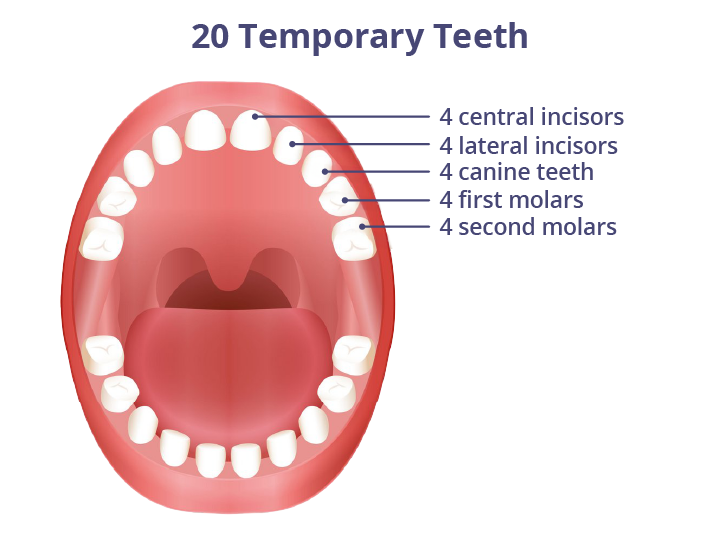Teething and baby teeth
7-minute read
Key facts
- Baby teeth start to come through when your child is about 6 months old.
- Most children will have all their teeth by the time they turn 3 years.
- You can care for your child's teeth by keeping them clean and limiting sugar in their diet.
- If you are worried about your baby's tooth development, speak to their doctor.
- Dentists can give you and your child tips on how to keep their teeth and gums healthy.
What are baby teeth?
Babies are usually born with 20 baby teeth (also known as 'primary' or 'temporary' teeth). They start to come through the gums at about 6 months of age. This process is called teething.
By the time your baby is 2 to 3 years old, all their teeth will usually have appeared.
Babies have 5 sets of teeth:
- 4 central incisors
- 4 lateral incisors
- 4 canine teeth
- 4 first molars
- 4 second molars
There is one set on each side of the upper jaw, and one set on each side of the lower jaw.

When your child is about 6 years old, their adult teeth will start to replace their baby teeth. Adult teeth are also known as 'permanent' teeth or 'secondary' teeth.
Baby teeth differ from adult teeth because:
- they have a thinner enamel covering, which makes them look whiter
- their roots are narrower and differently shaped, allowing space for adult teeth to grow underneath
Natal teeth
Natal teeth are teeth that some babies are born with. This is not very common. These teeth are usually part of the baby's normal set, but come in early. They can sometimes cause problems with feeding or make the baby's mouth sore. In some cases, the teeth might need to be smoothed down or taken out, but often they can just be watched by a dentist. The dentist may also refer the baby to a specialist.
Why are baby teeth important?
Baby teeth are important because they:
- help your child chew their food easily
- help your child say words properly
- keep a place in their jaw for their permanent teeth
It is important to keep baby teeth clean to protect them against oral diseases such as tooth decay.
When will my baby start teething?
Baby teeth commonly start to appear in the mouth from 6 months until 2 to 3 years old.
Teething can be uncomfortable for some babies, especially when their molars come through. This is usually between 1 and 3 years of age
It's normal for babies' teeth to come in at different times, so try not to worry. Teething does not happen at the same time for all babies.
How will I know if my child is teething?
Even before you start to see a tooth erupt, you may notice some changes in your baby's behaviour. Signs that your baby may be teething include:
- red swollen gums
- dribbling
- being cranky or restless
- a slight fever
- crying on and off for a few days
- sucking fingers, fists and other objects
Teething is not usually associated with illness. If your baby has symptoms such as coughing, rashes, diarrhoea, vomiting, seizures, or a high fever of 38°C or more see your doctor, as your child may need treatment.
How can I ease my child's discomfort?
When your child is teething, keeping them comfortable can be a challenge. Some tips include:
- Wash your hands, and then gently rub your baby's gums.
- Give your baby a cooled (but not frozen) teething ring.
- Apply a cold compress and see if this brings your baby some relief.
- If your child is in a lot of pain, you can give them paracetamol — follow the dose instructions on the pack.
What should I avoid or be aware of?
Teething gels
Teething gels should be avoided as they can be harmful, and some have serious health concerns. If you choose to use teething gels, do not use mouth gels that contain anaesthetic — they are not recommended for children or babies.
Dummy
Some people use dummies (pacifiers) to try to provide children with relief and comfort while they are teething. Dummies can affect normal growth and development of teeth and jaws. Never dip a dummy in sugary spreads such as honey or jam as this can increase your child's chance of tooth decay.
Amber beads
Beaded necklaces or bracelets are a potential choking and strangulation hazard and should be avoided.
If your teething pain causes you or your baby distress, see your doctor, dentist or maternal child health nurse.
How to care for baby teeth
Baby's teeth should be cleaned as soon as they appear. You will need to help your baby or child, care for their teeth.
Children over 18 months should be cleaning their teeth twice a day. They can use a pea-sized amount of children's low-fluoride toothpaste. Try to teach them to spit toothpaste out and not swallow it.
The recommendation is to make sure all teeth and gum surfaces are efficiently cleaned, for around 2 minutes, twice a day. You will need to help your child clean their teeth.
Speak to your dentist about how you can make this an easier process.
If you are concerned about your child's teeth, make an appointment with your dentist to have their teeth checked.
Your child's diet
Avoid giving your child juices or sugar-sweetened drinks, and foods or drinks with added sugars. This is because eating too much sugar can cause tooth decay. Do not add sugar or other sweeteners to your baby's food, as it can increase the chance of tooth decay.
It's best not to put your baby or child to bed with a bottle of milk or formula, as it can also increase the chance of tooth decay.
Be sure to keep their dummy or pacifier clean, and don't dip it in honey.
Visiting the dentist
Take your child for their first dentist appointment when their first teeth appear, or by their first birthday. They should then continue seeing a dentist regularly throughout life.
The first dental visit will involve your dentist examining your child's teeth. At this visit, you can ask about important oral health topics, including:
- tips for cleaning your child's teeth
- what to expect as your child's mouth continues to develop
- thumb sucking and dummy use
- how to help prevent tooth decay
- avoiding injury to your child's teeth
- advice on diet
- appropriate use of fluoride
Is there financial help with dental costs for my child?
If you receive a government benefit, such as Family Tax Benefit A payments, your child may be eligible for the Child Dental Benefits Schedule. This benefit is for general dental treatment.
To check if your child is eligible, call Medicare on 132 011, or check online at MyGov.
Resources and support
The Australian Dental Association has helpful information about your baby's first dental visit and baby teeth development.
Watch the 2-minute tooth brushing song for kids from Queensland Health.
Other languages
The Australian Dental Association has translated factsheets in languages other than English.
Information for Aboriginal and/or Torres Strait Islander peoples
The Australian Dental Association has resources specifically for Aboriginal and/or Torres Strait Islander families.
NSW Health has information about keeping your children's teeth healthy.

Speak to a maternal child health nurse
Call Pregnancy, Birth and Baby to speak to a maternal child health nurse on 1800 882 436 or video call. Available 7am to midnight (AET), 7 days a week.
